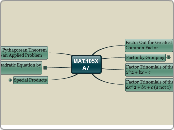a David Kedrowski 14 éve
342
MAT.105X A7
The process of factoring polynomials involves breaking down a polynomial into a product of two or more simpler polynomials. Initially, one must factor out the greatest common factor (

a David Kedrowski 14 éve
342

Még több ilyen
a^3 + b^3 = (a+b)(a^2 - ab + b^2)
a^3 - b^3 = (a-b)(a^2 + ab + b^2)
a^2 - b^2 = (a+b)(a-b)
a^2 + 2ab + b^2 = (a+b)^2
a^2 - 2ab + b^2 = (a-b)^2
If ab = 0, then a = 0 or b = 0.
A quadratic equation can be written in the form ax^2 + bx + c = 0, where a, b, and c are real numbers and a is not zero.
Given a right triangle with legs of length a and b and hypotenuse of length c,
a^2 + b^2 = c^2
or
(leg)^2 + (other leg)^2 = (hypotenuse)^2
A right triangle is a triangle that contains a 90 degree angle.
The two sides of the triangle that meet to form the 90 degree angle are called legs.
The remaining side, opposite the 90 degree angle, is called the hypotenuse.
If the trinomial is not prime, trinomials of the form ax^2 + bx + c can be written using four terms and then applying factoring by grouping.
Consider the nonprime trinomial ax^2 + bx + c. We begin by finding the product ac. Then we find a factorization of ac, let's say mn, where ac=mn and m+n=b. Now we can write the trinomial as ax^2 + mx + nx + c. Apply factor by grouping to this polynomial with four terms.
Remember to look for a GCF first.
Another method called the trial-and-error method can also be used to factor trinomials of this type.
If the trinomial is not prime, trinomials of the form x^2 + bx + c can be written as (x + m)(x + n) where mn=c and m+n=b.
Remember to look for a GCF first.
This can be a good method when factoring a polynomial with four terms.
To factor a polynomial is to write it as a product of two or more polynomials.
Factoring polynomials is the opposite of multiplying polynomials.
Factoring out the GCF of a polynomial (if one exists) should always be the first step when factoring a polynomial completely.
Factoring a polynomial can take many more steps than just one.
To factor an integer is to write it as the product of two or more integers.
The greatest common factor (GCF) of a group of monomials is the largest common factor of the terms in the group.